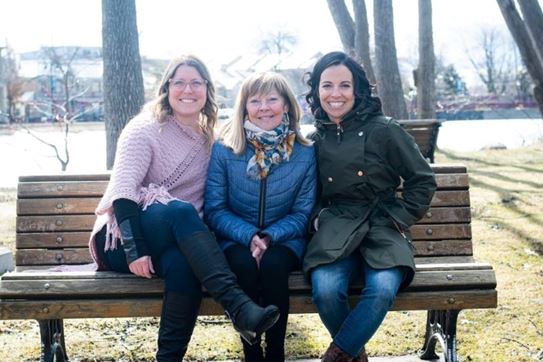Louise-Hélène Giroux faced the greatest challenge of her life when she was diagnosed with metastatic melanoma at 69. During this difficult time, she found hope in the unconditional love of her family, the support and attentiveness of her friends, and a clinical trial for a new treatment approach which she courageously decided to take part in.

A shocking diagnosis
Nagging pain in her collarbone led Louise-Hélène to see her doctor. After multiple exams, she still didn’t know what was causing her symptoms. It was only in September 2021, after a biopsy, that she found out she had stage 4 skin cancer. She was told she would only live a few months if her tumour did not respond to treatment.
“I fell out of my chair,” Louise-Hélène says, recalling her initial reaction upon receiving the diagnosis. Apart from the pain that extended from her collarbone to her arm, she hadn’t noticed anything out of the ordinary with her health.
Renewed hope for research
Fortunately, Dr Rahima Jamal, an oncologist at the University of Montreal Hospital Research Centre, suggested that she take part in a Canadian Cancer Society-funded (CCS) Phase I clinical trial for people with advanced melanoma.
Louise-Hélène was among the very first to enroll in this innovative trial led by Dr Bertrand Routy. Participants in the trial were asked to eat capsules containing poop from a healthy donor, a process called fecal microbial transplantation (FMT). After taking the capsules, they then went on to receive immunotherapy treatments. The goal of FMT is to stimulate healthy gut bacteria in the patient, and in turn improve the effectiveness of immunotherapy.
“I didn’t say yes right away,” Louise-Hélène says. “When I heard the words ‘fecal microbial transplantation,’ it sounded strange. I thought I misunderstood, but thankfully, I chose to follow the advice of a specialist.”
Louise-Hélène is grateful for the invaluable guidance of Camille Amiel, a nurse at the research centre who comforted her and persuaded her to take part in the trial. Today, thanks to this treatment, she is now in remission.
If you are ever diagnosed and are offered this treatment, my advice would be: ‘It may seem weird, but it will help you.' I am so grateful to the Canadian Cancer Society and to its donors and partners for funding research projects like the one that saved my life.
Funding for an innovative new clinical trial
Her treatments now completed, Louise-Hélène has been able to return to the activities she enjoyed before her cancer diagnosis, such as spending time with her grandchildren and riding her motorcycle with her partner. The fact that she can celebrate her remission and enjoy every moment of her life underscores the importance of continuing to support research and innovation.
Now, with additional funding from CCS and support from the Weston Family Foundation, researchers are bringing the promising results of Dr Routy’s initial FMT trial to even more people. A Phase II trial being led by Dr Arielle Elkrief through the Canadian Cancer Trials Group will confirm the effectiveness of this new approach by testing it in over 120 people across Canada.

